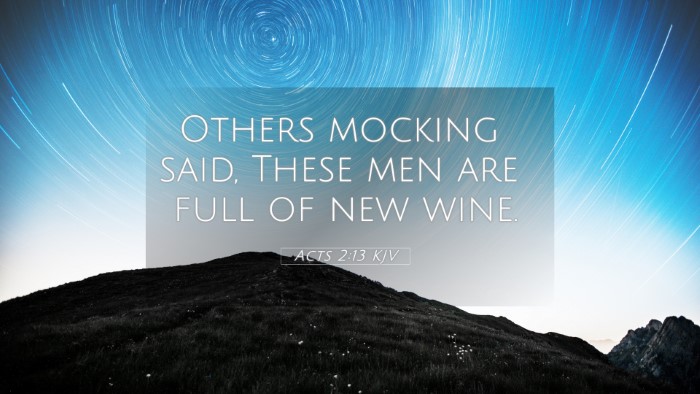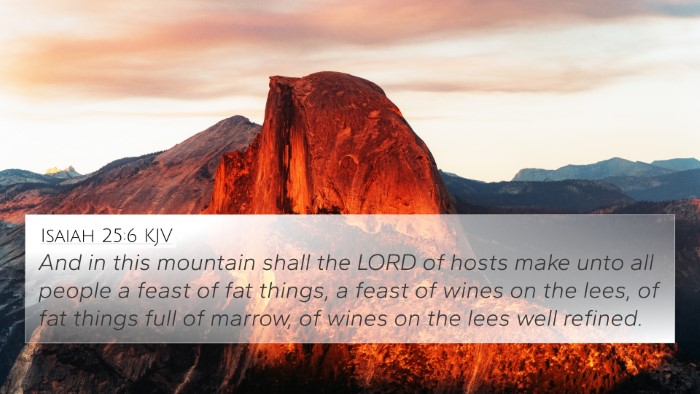Understanding Acts 2:13
Acts 2:13 states, "Others mocking said, 'They are full of new wine.'" This verse occurs during the Pentecost, a pivotal event in Christian history where the Holy Spirit descended upon the apostles, enabling them to speak in different languages. The reaction of the crowd included skepticism and derision.
Exegesis of Acts 2:13
To gain a deeper understanding of Acts 2:13, we can turn to several public domain commentaries for insight.
- Matthew Henry:
Henry notes that the mockers misunderstood the spiritual phenomenon occurring before them, reflecting a broader theme of misunderstanding divine workings. The phrase "full of new wine" implies an accusation of drunkenness, symbolizing a failure to grasp the significance of the outpouring of the Holy Spirit.
- Albert Barnes:
Barnes explains that the mockers of the apostles were in disbelief regarding the miraculous events of Pentecost. This skepticism highlights human tendency to dismiss divine interventions. He connects this mockery to prior prophetic warnings of such rejection of spiritual truth.
- Adam Clarke:
Clarke elaborates that the term "new wine" signifies a misunderstanding, as the apostles were not intoxicated but filled with the Spirit. This misinterpretation mirrors common patterns where people react with skepticism towards unexpected divine actions.
Thematic Connections
This verse opens up a myriad of thematic Bible verse connections that reflect the dynamics of faith, skepticism, and the workings of the Holy Spirit in the early Church. Understanding Acts 2:13 allows us to explore:
- Spirit vs. Flesh: The contrast between the spiritual experience of the apostles and the fleshly interpretation by onlookers.
- Mocking and Rejection: The theme of mockery faced by prophets and followers throughout scripture.
- Understanding Spiritual Gifts: Challenges in recognizing and validating spiritual gifts and occurrences.
Cross References
Acts 2:13 can be cross-referenced with numerous other Bible verses that explore similar themes of divine manifestations, mockery, and the role of the Holy Spirit. Below are some related scriptures:
- Acts 2:4: Describes the apostles being filled with the Holy Spirit and speaking in tongues.
- Luke 5:37-38: Discusses new wine and old wineskins, symbolizing the transition of the Old Covenant to the New Covenant.
- 1 Corinthians 2:14: Talks about spiritual discernment, highlighting the inability of the natural man to understand spiritual truths.
- Isaiah 29:9-10: Reflects the theme of those who are spiritually blind and cannot perceive the workings of God.
- Matthew 27:39-44: Describes mockery faced by Jesus during His crucifixion, showing a historical pattern of disbelief and scorn towards the divine.
- John 10:20-21: Refers to accusations of madness directed at Jesus, paralleling the accusations of drunkenness against the apostles.
- 1 Peter 4:4: Speaks on how those who are not walking in the Spirit may find it strange that believers do not join in their excesses.
Comparative Bible Verse Analysis
In performing a comparative Bible verse analysis, it's essential to examine how Acts 2:13 fits into the wider narrative of the Book of Acts. The response of the crowd serves as a backdrop for Peter's subsequent sermon, which seeks to provide clarity and bring understanding to divine action that had just occurred. Here, the witness of the apostles manifests in a transformative way as Peter addresses the mockery head-on in Acts 2:14-36.
Inter-Biblical Dialogue
The inter-Biblical dialogue regarding the themes contained in Acts 2:13 and its surrounding verses brings to light the continuity of God's work through various epochs. The consistent response of humanity to the divine, whether through skepticism or faith, points towards the complexity of the human experience in relation to God's actions.
Conclusion
In summary, Acts 2:13 presents a rich theological narrative surrounding the Pentecost event, emphasizing the mixture of faith, skepticism, and the transformative power of the Holy Spirit. By exploring the connections between this verse and others, we gain a greater understanding of the early Church's experiences and the ongoing relevance of these themes in our lives today.












